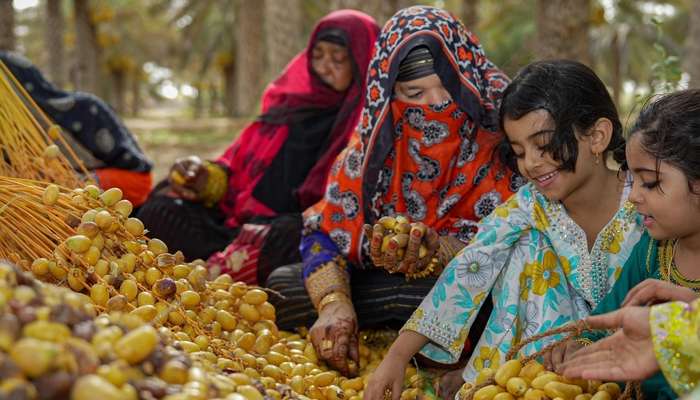
Muscat: The Wilayat of Jaalan Bani Bu Hassan in South Al Sharqiyah Governorate produced 7,798 tonnes of Al Mabasli dates in 2023.
The harvest and dressing season at Al Mabasli dates is one of the most prominent customs and traditions inherited from the ancestors among farmers of the village of Falaj Al-Mashaykh in the Wilayat of Jaalan Bani Bu Hassan in the South Al Sharqiyah Governorate.
The Al-Mabasli harvest season provides income to the people of the wilayat for which farmers are keen to take care of the palm trees.
The Al Mabasli harvest season begins from the end of June until the end of July each year, and is characterised by abundant production.
Salem bin Sultan Al Araimi, Director of the Department of Agricultural Wealth, Fisheries and Water Resources in the Wilayat of Jaalan Bani Bu Hassan, said that the number of palm trees in the Wilayat of Jaalan Bani Bu Hassan in the Governorate of South Al Sharqiyah is 115,367, while the quantity of their production reached 7,798 tonnes in 2023, with an average production of 68 kilograms per palm tree.
The Director of the Department of Agriculture , Fisheries and Water Resources in the Wilayat of Jaalan Bani Bu Hassan, added that the Ministry of Commerce , Industry and Investment Promotion is working in coordination with the Nakheel Development Company to purchase basoor of various types to transform them into added value that contribute to enhancing the economic return and export to foreign markets.
He explained that the Ministry of Agriculture , Fisheries and Water Resources plays an important role in developing the date sector by adopting modern methods of farming and taking care of palm trees through prevention programmes from the palm pests, in addition to carrying out research, tissue propagation and agricultural extension work.
He pointed out that the Ministry seeks annually to provide a number of diverse textile palm varieties, distribute them to farmers, and develop many programmes to protect palm trees from pests, especially the palm dubas insect and the red palm weevil, which negatively affect trees.
Regarding the stages of the dressing process, Khamis bin Hamad Al-Mashayikhi, a resident of Falaj Al-Mashayikh, said:”The process of dressing begins after the fruits of the Al-Mabsley palm tree become fully yellowed, “bisr”, and then the harvesting process takes place, called “Al-Jaddad”. Then the farmers transfer it to what is called (the pot) to carry out the cooking process, then place it on the stove to dry for a period of approximately 5 to 7 days, depending on the outside air temperature, and then it is assembled.